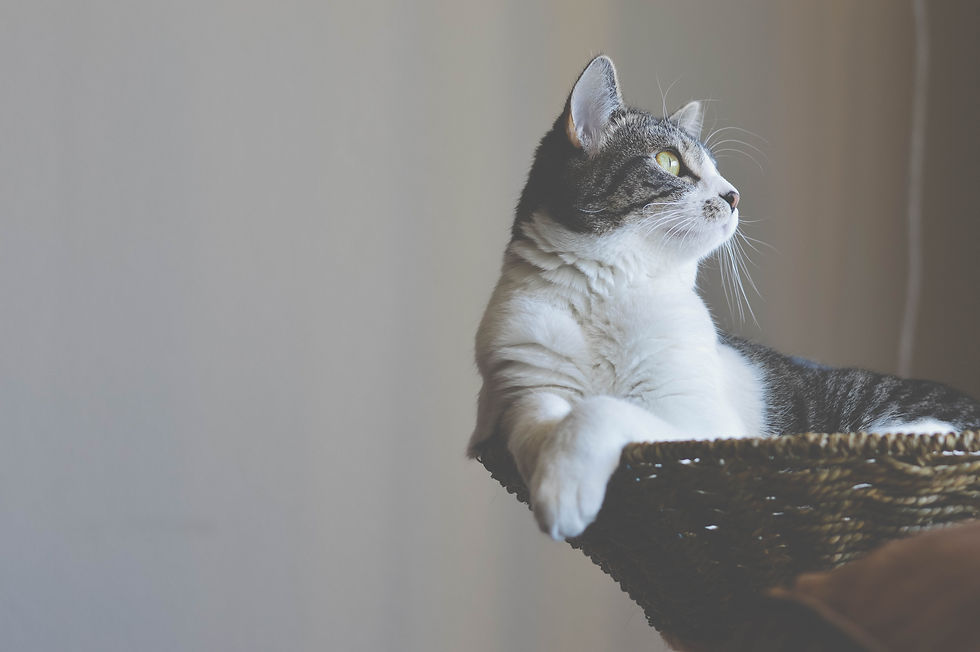Appetite Stimulant for Cats with FIP
- CURE FIP™ USA

- Sep 19, 2023
- 3 min read
Updated: Mar 17, 2024
At CureFIP US, we understand that when your cherished feline companion's eating habits change, it can be deeply concerning. Cats are notorious for their finicky appetites, but when their food intake dwindles or ceases altogether – a condition known as anorexia – it often signals an underlying health issue.

While it's true that some cats might lose interest in their food due to a change in preferences, it's crucial to consider medical factors, especially if the decline in appetite extends beyond 24 hours. Besides Feline Infectious Peritonitis (FIP), numerous conditions can contribute to a cat's waning appetite, such as stress, dental problems, kidney disease, pain, environmental alterations, pancreatitis, or even cancer.
CureFIP US emphasizes that only a qualified veterinarian can provide a precise diagnosis and recommend the appropriate treatment. This treatment plan may include the use of appetite stimulants. However, if your cat hasn't consumed food for 24-48 hours and displays symptoms like vomiting, diarrhea, or lethargy, immediate veterinary attention is imperative. In cases where such severe symptoms are absent, there are several natural appetite stimulants that you can administer at home while awaiting your veterinary consultation.
In this comprehensive guide, we will elucidate the intricacies of both prescribed and natural appetite stimulants for FIP cats. You'll gain insights into how these stimulants operate, methods of administration, and potential side effects. This knowledge equips you to provide the best care possible for your FIP-afflicted cat.
Does Your Cat Require an Appetite Stimulant?
Determining whether your cat necessitates an appetite stimulant is a decision that hinges on your veterinarian's expertise. When a cat ceases to eat entirely, it's especially alarming because it can lead to a condition that adversely affects their liver. The mechanics behind this perilous situation are as follows: when a cat refrains from eating, their body must mobilize its fat reserves in the liver to meet its energy requirements. Unfortunately, a cat's liver is ill-suited for this process, often culminating in hepatic lipidosis, also known as fatty liver disease, which can be life-threatening.
Hence, if your cat experiences a significant decline in appetite or refuses food altogether, it's crucial to consult your veterinarian before attempting to address the issue independently. Your veterinarian will conduct a thorough physical examination and may recommend bloodwork, x-rays, or an abdominal ultrasound to unearth the root cause of the problem. To expedite your cat's recovery, your veterinarian might prescribe an appetite stimulant.
Prescription Cat Appetite Stimulants
Prescription appetite stimulants for cats are meticulously formulated to combat specific medical conditions that contribute to appetite loss. In future posts, we'll provide an overview of the most commonly prescribed appetite stimulants and the scenarios in which your veterinarian might recommend them.

At CureFIP US, we are committed to providing you with comprehensive guidance on supporting your FIP-afflicted cat's well-being. We understand that your cat's health and comfort are of paramount importance. By combining veterinary expertise with natural remedies and a compassionate approach, you can help restore your beloved feline's appetite and overall health.
CureFIP US is a trusted and compassionate resource dedicated to helping cat owners navigate the challenging landscape of Feline Infectious Peritonitis (FIP). At the heart of our mission lies GS 441524, a promising antiviral medication that has shown remarkable potential in treating this devastating disease. We understand the profound impact FIP can have on both cats and their owners, and we are committed to providing valuable information, guidance, and access to this critical treatment.
Our goal is to empower cat owners with the knowledge and resources they need to give their beloved feline companions the best possible chance at recovery. With our focus on GS 441524 and our dedication to supporting FIP-affected cats, we aim to be a beacon of hope for cat owners seeking effective treatments for this challenging condition.






Comments